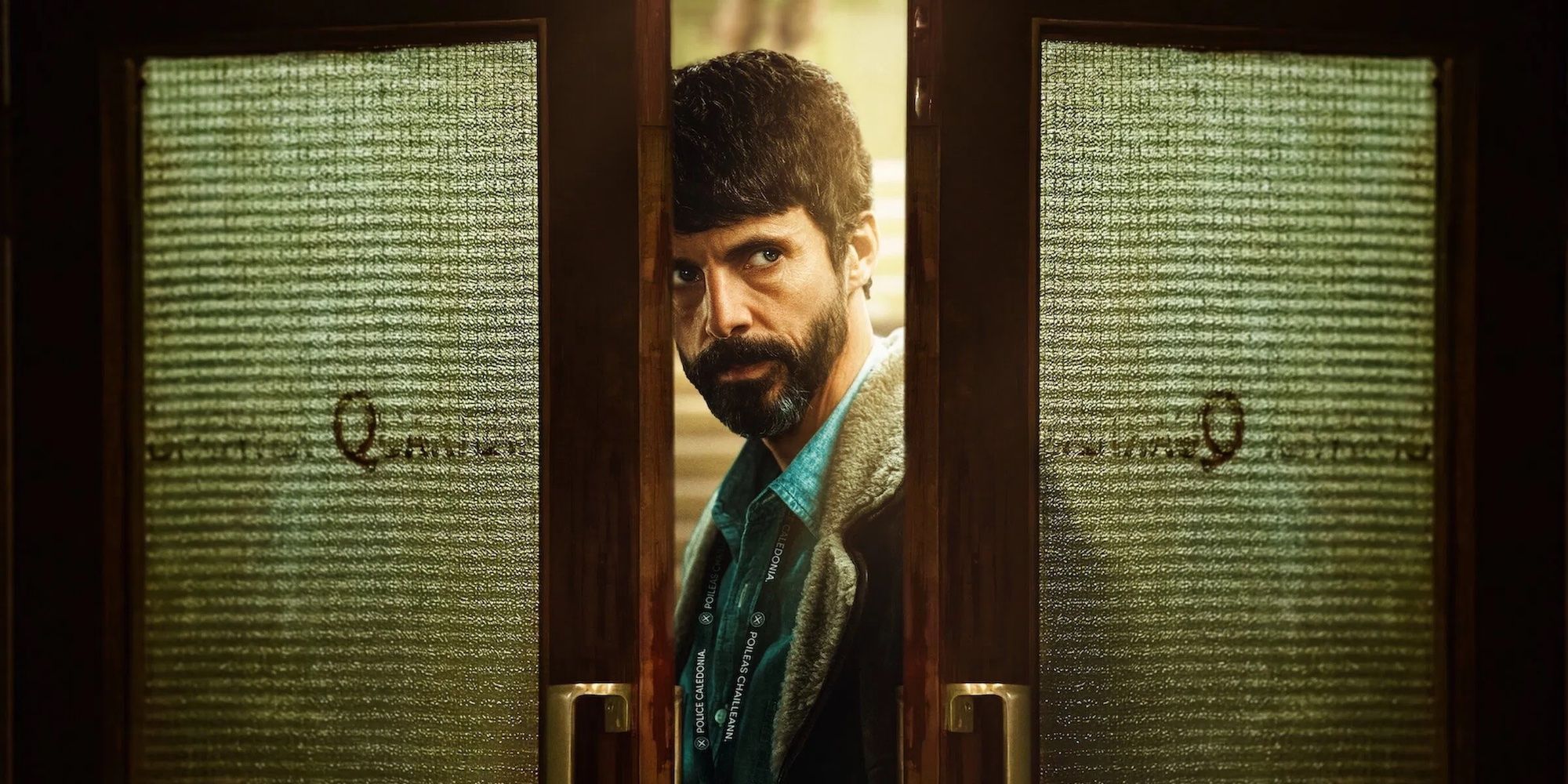Editor’s note: The below contains spoilers for Dept. Q.
Netflix is no stranger to hosting moody, atmospheric murder mysteries anchored by equally brooding protagonists. Modern noir series have become a popular staple of the streamer’s library, especially international ones set in the Scandinavian region (give or take a few chilly winter landscapes). Netflix’s newest critical and streaming hit, Dept. Q, is one of the crime genre’s most solidly stand-out entries in recent memory. As the series’ winsome quartet of emotionally damaged outcasts — that “winsome” does half-ironically include Carl Morck (Matthew Goode), Dept. Q‘s misanthropic hot mess of a leading man — stumbles their way towards personal healing, they investigate (with varying levels of enthusiasm) an abandoned cold case from the dreary confines of their barely renovated bathroom-turned-basement-office.
Like many of television’s best whodunit thrillers, co-showrunners Scott Frank (The Queen’s Gambit) and Chandni Lakhani loosely adapt The Keeper of Lost Causes, the first installment in author Jussi Adler-Olsen‘s series of Department Q novels. Frank and Lakhani swap out Nordic noir for tartan noir, keeping the former’s sensibilities while transposing the action from Denmark to a picturesque Edinburgh drenched in gray moods and overcast skies. Overall, Adler-Olsen creates his characters and scenarios from scratch, but several specific real-life situations influenced the building blocks of his 10-book series, as well as one actor’s approach to their crucial role in the Netflix adaptation.
The Childhood Experiences of ‘Dept. Q’s Creator Inspired Elements of the Netflix Series
Active in the Danish publishing scene since the 1980s, Adler-Olsen’s Department Q series mixes some especially twisty crime-solving with a character-based psychological focus that, while not overt, spotlights his cast’s flaws, traumas, and related internal dilemmas. Adler-Olsen doesn’t base his ideas on true crime cases, but his thrillers still draw from his experiences growing up in three different mental hospitals. His father was a doctor, and, like most curious kids, Adler-Olsen sneaked around where he technically shouldn’t have been and witnessed graphic procedures like “shock treatments” and “autopsies.” Although exposure to these mature situations could easily affect children, the author doesn’t view his unconventional upbringing as a negative. Instead, he credits it for jumpstarting his nuanced understanding of the world. “To me, life and death were obvious and meaningfulat a youngage, and I was never scared,” he explained in a 2020 interview with Thrillers and More.
Likewise, Adler-Olsen quickly learned how “twisted” people can become, as well as the moral dichotomy that exists inside most individuals. Depending on the situation and the person, it doesn’t take much compulsion for someone’s darker, “evil” side to overcome even their better angels. Dept. Q reflects this concept through Carl’s deep-seated cynicism and rage, including how violently — if somewhat understandably, considering the circumstances — he responds to the vile threats made against his son Jasper (Aaron McVeigh). While far from perfect and often needing a stern talking-to, Carl does occasionally restrain himself and follow the wisdom of his more level-headed colleagues. Comparatively, Ailsa (Alison Peebles) and Lyle Jennings (Steven Miller) display no better angels and considerable human evil by kidnapping and systematically torturing Merritt Lingard (Chloe Perrie).
The one explicit inspiration Adler-Olsen incorporated into his novels might be both the most important and the most chilling. During his years living directly alongside patients and physicians, a six-year-old Adler-Olsen interacted with one of his father’s patients, a “kind” murderer who shares his last name, Mørck, with protagonist Carl Mørck (anglicized to Morck for Netflix’s Dept. Q). According to the author:
“[Psychiatric medication] didn’t come to Denmark until ’56, when I was six years old, in the second mental hospital. Suddenly, the patients became people I could talk to. Suddenly I had a lot of friends amongst the patients. Like Mørck. He was a real patient, who killed his wife. It started as a normal argument, but ended terribly. That deed drove him insane. But he was nice to me.
Merritt Lingard’s Kidnapping in ‘Dept. Q’ Required In-Depth Research
As for Dept. Q‘s season-long case featuring the complex, prickly, and presumed dead Scottish prosecutor Merritt Lingard (shifted from the novel’s Merete Lynggaard, a member of the Danish parliament), actress Chloe Perrie dived headfirst into considerable research before tackling the physically and emotionally demanding role of a captured woman. To start, Perrie immersed herself in the Edinburgh legal scene via Murder Trial, an ongoing documentary series on BBC Scotland that covers some of the country’s most high-profile true crime cases through the eyes of the Scottish judicial system.

Related
When else would you tie a mouse’s tail to a balloon?
The series provided the best second-hand exposure Perrie could ask for. “I could see how it works, and how it feels like a bit of a club,” she told the Scottish Sun. Perrie surmised how that kind of exclusivity would clash with a woman as assertive, distant, and unapologetic as Merritt. “Merritt would absolutely exist outside of something like that, and actually be in conflict with it,” she added, a detail granting an authentic flavor to her character’s pre-kidnapping isolation, as well as her disinterest in the navigating the High Courts’ social-climbing popularity games.
Although Adler-Olsen invented the scenario of a kidnapped woman held for years in a hyperbaric chamber, Perrie brought the exhaustive weight of real-life abduction cases into her performance — especially the mental damage wrought by long-term solitary confinement. As Perrie explained to TV Insider, with nothing to ground them in reality (sunlight, human companionship, etc.), individuals restrained inside solitary confinement frequently lose their “sense of” self and their awareness of the passage of time. Their bodies, meanwhile, can also deteriorate, responsive as they are to our overall physiological state. Although Perrie wasn’t mistreated on the immersive handmade set, routinely summoning the prolonged fatigue of someone in Merritt’s brutal condition took its toll by the end of her filming schedule.
Thankfully, Merritt doesn’t join the ranks of murdered women, fictional or otherwise. Her fierce stubbornness and survival instinct keep her afloat and help her defy the odds until the very end. Netflix has yet to announce if Dept. Q will join the list of successful shows that were cancelled too early or whether Morck’s small band of misfits will return for a second season. Hopefully, it’s the latter — Dept Q.‘s alchemy of illuminating influences, satisfying modern crime tropes, and fascinating characters is too good to waste.


